Published Jun 10, 2014
Star Trek Archive: DeForest Kelley Star Trek IV Interview
Star Trek Archive: DeForest Kelley Star Trek IV Interview
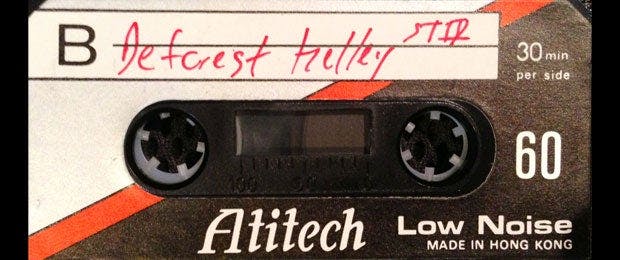
StarTrek.com promised that we’d pull things out of the archives. We’ve shown you an old promo/synopsis for the TNG episode “Bloodlines,” and we’ve got plenty more behind-the-scenes bits on the way, including inside looks at press kits, stickers used on Trek sets that were affectionately called Okudagrams, the announcement revealing Genevieve Bujold’s departure from Voyager, and much more. For today’s dip into the archive, we found an old audiotape that dates back to 1986. On it? A great roundtable interview with DeForest Kelley, who died on this day in 1999, conducted during the press junket for Star Trek IV: The Voyage Home.
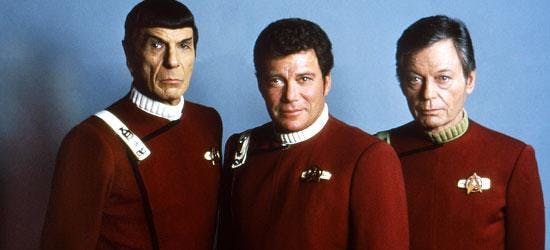
Some background… For several decades, studios have promoted their latest films at press junkets. Usually held at a hotel in Los Angeles or New York City, junkets bring together media outlets from around the globe to talk to the talent involved in a film. They’ll do TV interviews one day and print, radio and now online interviews another day. For the print/radio interviews, the talent will sometimes sit together in a group for a press conference. Other times, they’ll sit for roundtable interviews. For a roundtable session, the studio might set up six circular tables in a ballroom, with 10 chairs around each table. Journalists will fill nine of the chairs, while those involved with the film – say the director, the producer, and four actors – will fill that 10th chair and rotate from table to table for about 20 minutes at a time. So, after two hours, those 54 journalists have six separate interviews with talent from that film and can write up features for their respective outlets.
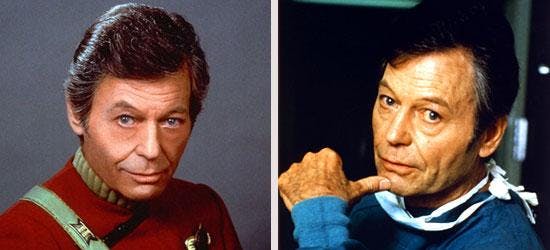
The Star Trek IV junket was held in Los Angeles and the talent on hand that day included William Shatner, director/star Leonard Nimoy, DeForest Kelley, several of the longtime supporting actors, and also the film’s main newcomer, Catherine Hicks. Back then, the talent sat for an hour at each table. Moments before Kelley settled in to talk to his first group of the day, a Paramount publicist prefaced the conversation by asking, for the sake of time, that no one ask Kelley for autographs before or after the interview. Here are excerpts from Kelley’s easygoing, laugh-filled roundtable interview.
KELLEY: Good morning. Good morning, America. Can everybody hear me? I’ll try to speak up. Are you recording this? I’d better be careful, then, and watch my Southern language.
How do you keep Dr. McCoy so irritable?
KELLEY: Well, mostly from hanging around Spock! How do I manage to keep from being irritable around him? is a more sensible question. No, I’ve had a great deal of fun working with Leonard and we enjoy our relationship very much. It’s kind of fun to look back over the years at some of the old episodes and see ourselves rather grow old together. But we hope to have some more fun down the line somewhere.
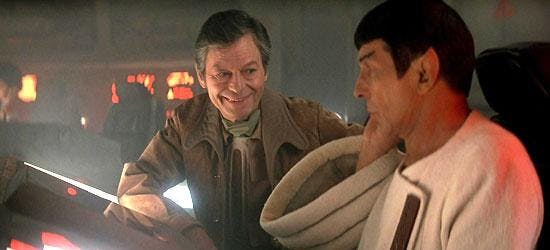
We don’t see quite as much of Dr. McCoy in The Voyage Home as we’d like to…
KELLEY: I was actually talking about this yesterday. It’s very difficult to expand or flesh a character out in a motion picture, so to speak. When we’re doing them, it takes a couple of years to get one out. If we were still doing the series, why, it would be a lot of fun to see how these characters change during the aging process. So what I tried to do in number four is kind of… not soften McCoy, but he’s become a little more attuned to Spock and he’s looking at him more or less with a bit of amusement, as opposed to becoming so irritated with him. Not that he doesn’t become irritated with Spock, but McCoy has mellowed a little bit during this timeframe. As I say, if we were doing even six 90-minutes shows a year we could expand on that, but when you shoot one motion picture every two years, it’s rather a problem because it’s very difficult to satisfy everyone. We only did 79 episodes (of TOS), but during those episodes there was bound to be one episode that perhaps everybody would like. You can’t do that with a motion picture because there’s going to be somebody who’s not going to like something about it.
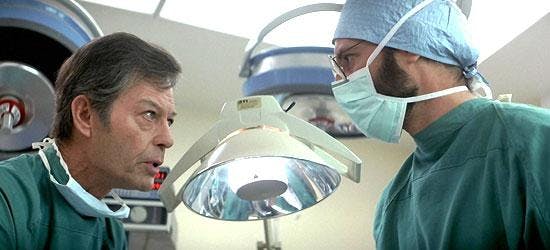
Dr. McCoy is irritable, but he’s not a heavy. You spent a long time playing heavies on TV and in movies…
KELLEY: Villains, heavies played a great part of my life. I spent perhaps 10 years doing heavies and they paid my rent for many years. I always enjoyed doing them. I felt that they were more interesting, in the long run, than the leading character. However, there were times when I would pick up a script and wonder when my character was going to get killed. I was always a pretty rotten guy, but hated to get knocked off too soon because it cut my paycheck a bit short.
I was not in either pilot that was made for the series. I had, in 1960, done a pilot (333 Montgomery Street) for Gene Roddenberry, in which I portrayed a criminal lawyer from San Francisco, who was a master lawyer. It was a marvelous series, but like a lot of things that Gene does, it was a bit far out and the network did not accept it. So that was my first experience with Roddenberry. I did another pilot for him called Police Story. For the benefit of those of you who don’t know, Gene was a cop for about eight years. He wrote a wonderful pilot that we made. Again, it didn’t sell. So when Star Trek came along he wanted me for the series, but I had been doing these very nasty guys and the network could not picture me in that role. He ran up against a stone wall. Now, I was shooting Police Story while they were doing the William Shatner (version of the Star Trek) pilot. So, Police Story went out for reactions, and as a result of the reaction process I got a high rating. And, oddly enough, I was not portraying a heavy. I was playing a police criminologist. And the network informed Gene that they had changed their mind. So I entered Star Trek on the first episode.
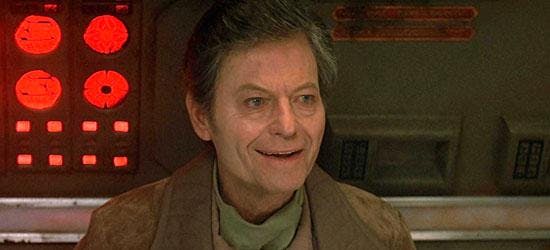
You were typecast as a heavy for that period before Star Trek, and then ended up being so associated with Star Trek that you really weren’t offered other roles once the show ended. How surprised were you by that turn of events?
KELLEY: I went from the frying pan into the fire, so to speak. I don’t know… it seems like Hollywood has an unhappy faculty for putting someone in a slot. They figure, “He’s there. That’s what he does best.” They forget about your background and what you’ve done and how you started out and how you got to where you are. I never really thought that I would be categorized by Star Trek because I thought, of the three principal characters, that McCoy was most-human character in the whole group. I did not feel that way about Bill or Leonard. The captain, you think about Flash Gordon or that sort of thing. And when I saw Leonard with his makeup, with the ears, I thought, “Well, he’s had it.” I thought, “McCoy is still kind of an ordinary human being walking around out there and I don’t think there will be any problems at all.” I was the most surprised man in the world when I was caught right in the same trap… if you can call it a trap.
It’s been a mixed blessing. I’ve enjoyed the role tremendously and, as the years have gone by, I have considered myself very fortunate to be a part of this show, which has become the phenomenon that it has. Many actors never get the opportunity to even be in a successful series, and here I have had the opportunity to be a part of what has become something most unusual in this country. So I have to look at it with all gratefulness.
I’m not proud of the fact that it has slotted me as such, but a great deal of that – not all of it, but a great deal of it – is my fault. I’m not the most driven actor in the world. I’m a lazy actor. I’d done an awful lot of things before Star Trek. If Star Trek ended for me tomorrow, or if had ended for me with the series, I would have been a contented human being because I’d have done a lot of things I was glad to have had the opportunity to do. Not that I was setting the world on fire, but I had fulfilled myself within. I had done what I set out to do.
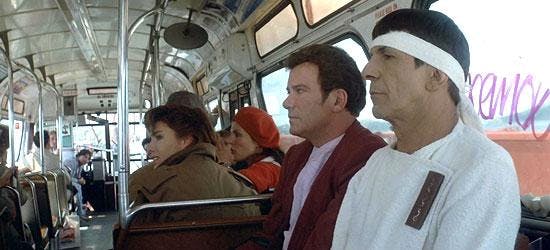
Star Trek IV is playful and funny, like many of the old episodes. How happy were you to see that return to franchise’s lighter side?
KELLEY: We did a lot of a comedy in the series. People have forgotten that, but we did a lot of humorous shows and a lot of tongue-in-cheek stuff, and we had a good time. And I think this movie reflects the feeling of the series more than anything we’ve done.
There’s a new Star Trek series in the works. What are your thoughts on it?
KELLEY: I really don’t know. I’m as curious about that as you are. Your opinions are certainly as valid, and maybe more valid than mine will be. Being as close to Star Trek as we are, it’s hard to imagine another Star Trek series. Gene Roddenberry has a great imagination, and if anyone can pull it off, Gene will. But there’s one thing you have to remember. I don’t care how good of an idea you have for a show – whether it’s science fiction or drama or whatever – you can have a terrific idea, but the people are the important thing. If the chemistry isn’t there, if these people don’t blend and work beautifully together, it’s not likely it will be a tremendous success because there have been many terrific ideas that have been put on television where you looked at it and said, “Gee, that’s a great idea, but there’s something about the characters that doesn’t work.” But they probably – and no doubt do, because they’ve got Paramount behind them – have an idea in mind that they’re very excited about. It might come off just wonderfully and pick up a whole new generation.
